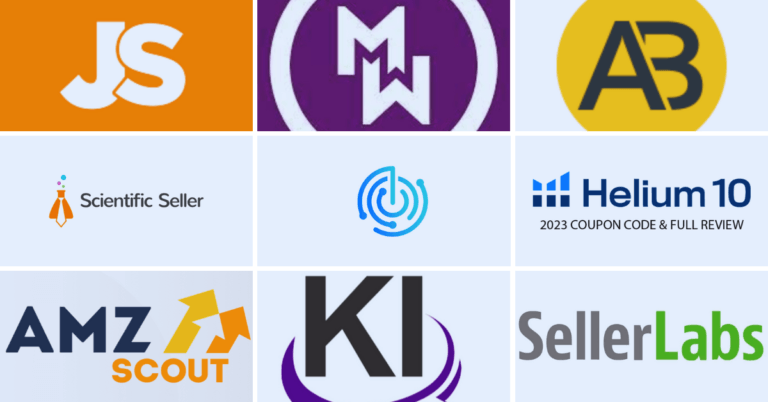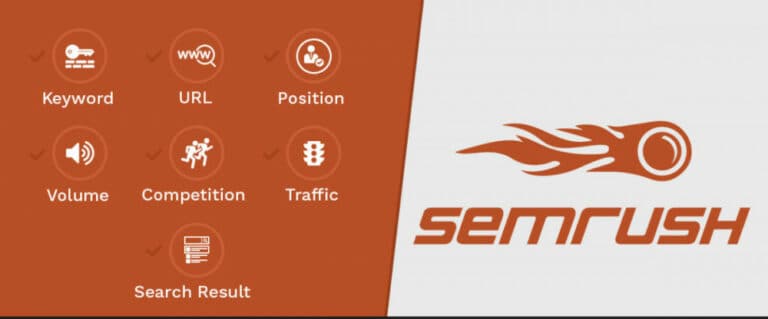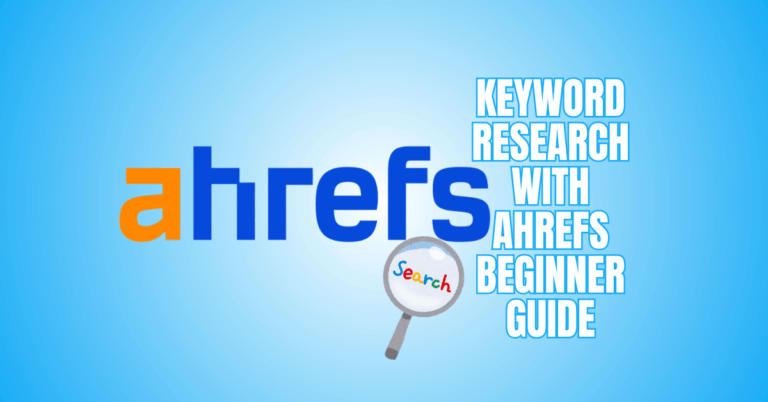Ahrefs vs Google Keyword Planner
Choosing between Ahrefs and Google Keyword Planner can be tricky for marketers and bloggers.
Ahrefs vs Google Keyword Planner: Ahrefs offers deep SEO insights, backlink tracking, and competitor analysis, while Google Keyword Planner provides accurate, free data straight from Google.
Understanding their unique strengths helps you pick the right tool for your goals. Let’s explore their differences to find the perfect fit for your keyword research journey.
What Is Ahrefs?
Ahrefs is a powerful all-in-one SEO tool trusted by marketers, bloggers, and businesses worldwide. Initially known for its backlink analysis, it has grown into a complete SEO platform that helps you understand and improve your website’s visibility.
With Ahrefs, you can research keywords, track rankings, analyze competitors, and perform detailed site audits—all from one intuitive dashboard.
Ahrefs is unique because of its extensive data index. You may obtain billions of backlinks and phrases from various search engines thanks to their continuous web crawling.
You may learn the terms your competitors rank for, the sources of their backlinks, and how to strategically outperform them.
Ahrefs also highlights content gaps, showing what topics your audience searches for but you haven’t covered yet. Its Keyword Explorer reveals search volume, difficulty, and traffic potential, helping you plan smarter content.
What Is Google Keyword Planner?
A trustworthy and free tool for keyword research, Google Keyword Planner assists marketers, advertisers, and content producers in identifying the ideal keywords for their campaigns.
It’s part of Google Ads and provides valuable insights straight from Google’s own search data, making it a trusted source for understanding what people are searching for online.
Using Google Keyword Planner, you can discover new keyword ideas, view average monthly search volumes, and analyze competition levels. It also provides cost-per-click (CPC) estimates, helping advertisers plan effective paid campaigns.
Even if you’re focused on organic SEO, the data from Keyword Planner can guide you toward keywords that attract real traffic and match your audience’s intent.
Even novices can efficiently utilize it because of its straightforward UI. All you have to do is input a topic or website, and the program will produce a list of pertinent keywords.
While it doesn’t offer advanced SEO metrics like Ahrefs, Google Keyword Planner remains an excellent starting point for anyone looking to understand search trends and build data-driven content strategies.
Wealthy Affiliate – Mini Review (2025)
If you’ve ever thought about turning your blog, passion, or niche into an online business,
Wealthy Affiliate (WA) is one of the most beginner-friendly platforms I’ve used.
It combines step-by-step training, website hosting, SEO research tools,
and an active community all in one place.
What I like most: you can start free (no credit card needed),
explore lessons, test the tools, and connect with other entrepreneurs
before upgrading. WA isn’t a “get rich quick” scheme — it’s a platform where success comes
from consistent effort and applying what you learn.
Pros And Cons Of Ahrefs
Pros Of Ahrefs
1. Comprehensive SEO Toolkit
Ahrefs offers everything you need to manage your SEO strategy in one place. You can research keywords, track your rankings, and analyze competitors effortlessly.
The site audit tool finds technical issues and suggests improvements. Content Explorer helps you discover trending topics that can boost traffic.
You may see who is linking to your website and your competitors by using backlink analysis. Having all these tools together saves time and keeps your SEO organized.
Whether you’re a blogger, marketer, or business owner, Ahrefs provides a complete solution that makes improving your website’s visibility simple, efficient, and actionable.
2. Accurate Keyword Difficulty Scoring
Ahrefs gives a keyword difficulty score that shows how hard it is to rank for a term. This helps you focus on achievable targets rather than wasting effort on impossible ones.
The score considers top-ranking pages and backlinks, giving a realistic picture of competition. You can prioritize lower-difficulty keywords to grow traffic faster and steadily. It’s like having a roadmap that guides your content strategy.
By understanding which keywords are realistic, you can plan smarter, save time, and improve your chances of ranking higher in search results without unnecessary frustration or guesswork.
3. Extensive Backlink Database
Ahrefs contains one of the biggest databases of backlinks, which are essential for SEO. You can see who links to your site and judge their quality and relevance.
Competitor backlink analysis helps you uncover opportunities to get links yourself. Tracking lost or broken links keeps your site's authority strong. This insight is invaluable for building a stronger SEO strategy and outranking competitors.
With Ahrefs, you can monitor links continuously, find new opportunities, and make informed decisions about link-building campaigns. Knowing your backlink profile is a real advantage for long-term SEO growth.
4. Frequent Data Updates
Ahrefs constantly crawls the web, updating its keyword, traffic, and backlink data regularly. This ensures you’re working with fresh, accurate information rather than outdated numbers.
Trends and search behaviours change quickly, and timely data lets you react effectively. It’s beneficial for seasonal campaigns or competitive niches where strategies can shift fast.
Frequent updates allow you to track growth, monitor competitors, and spot new opportunities before others do. With Ahrefs, your SEO decisions are informed and current, giving you an edge in search rankings. You always know what’s happening in your niche in real time.
5. Advanced Reporting And Visualization Tools
Ahrefs makes it easy to create professional, visually appealing reports for your SEO performance. You can export keyword lists, backlinks, and rankings in clear formats.
Graphs and charts show trends over time, helping you understand progress at a glance. Reports are perfect for sharing with clients, managers, or team members. You don’t need extra software to visualize data. Everything is organized and easy to interpret.
These tools let you highlight successes, track growth, and make informed decisions quickly. With Ahrefs, reporting is simple, professional, and practical, helping you showcase results confidently.
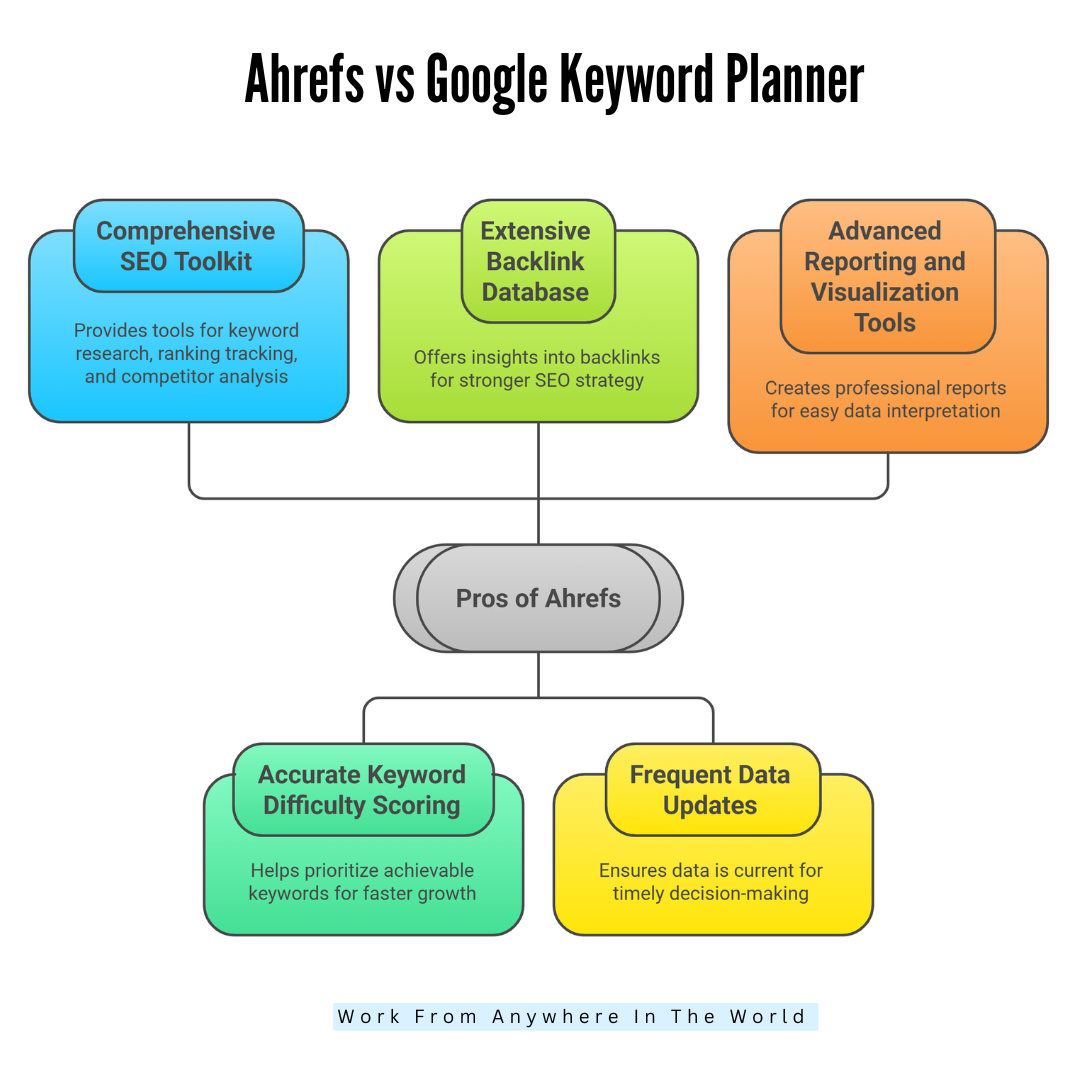
Cons Of Ahrefs
1. High Cost
Ahrefs is one of the most powerful SEO tools available, but its price can be intimidating for beginners or small businesses. Monthly plans start at nearly $100, which may feel steep if you're just starting.
For casual users, the investment might not match the actual usage since many features may remain unused. It’s more suitable for professionals, agencies, or businesses that are serious about SEO growth.
Before subscribing, consider whether you truly need all of its capabilities now or if starting with free or cheaper alternatives is enough to meet your current SEO and marketing goals.
2. Overwhelming For Beginners
Ahrefs provides an enormous amount of data, which can easily overwhelm new users. The dashboards, reports, and metrics are comprehensive, but it’s not always clear where to start.
Beginners might struggle to understand keyword difficulty, backlinks, site audits, and competitor analysis all at once. Without guidance, the abundance of features can feel confusing or intimidating. However, with time, tutorials, and practice, users quickly learn how to navigate the platform effectively.
Once familiar, the tool becomes highly efficient and valuable. Patience and learning are key to transforming initial overwhelm into actionable insights and real SEO results.
3. No Direct Google Ads Integration
Ahrefs focuses primarily on organic SEO and does not integrate directly with Google Ads. This means paid campaign insights, such as cost-per-click, ad performance, or real-time PPC data, are unavailable within the platform.
Businesses that manage both organic and paid strategies may need additional tools to track ad campaigns fully.
While Ahrefs excels at keyword research, backlink analysis, and competitor monitoring, the lack of Google Ads integration limits its usefulness for marketers who want an all-in-one solution.
Users must combine it with other advertising tools to gain a complete view of both paid and organic search efforts.
4. Learning Curve
Ahrefs offers advanced SEO features, but understanding and using them effectively requires time and effort. Interpreting keyword difficulty, search volume, backlinks, content gaps, and competitor metrics can be confusing for new users.
Beginners may feel lost or frustrated without tutorials, guides, or hands-on practice. Navigating multiple tools within the platform also adds complexity. However, once users learn how to use Ahrefs, it becomes extremely powerful and efficient.
The learning curve may deter casual users, but for professionals, the effort is worth it. With patience and practice, anyone can transform the challenge into valuable SEO insights and strategy improvements.
5. Limited Trial Options
Ahrefs offers minimal trial options, making it difficult for users to explore the whole platform before paying. Unlike free tools such as Google Keyword Planner, you often need a paid subscription to access most features.
This can be a challenge for small businesses or beginners who want to test the tool before committing financially. Some discounted trials exist, but they are often time-restricted and limited in functionality.
Users must carefully consider the cost versus their needs. While the tool is highly effective, the lack of a comprehensive trial can be a barrier for new users looking to evaluate its potential fully.
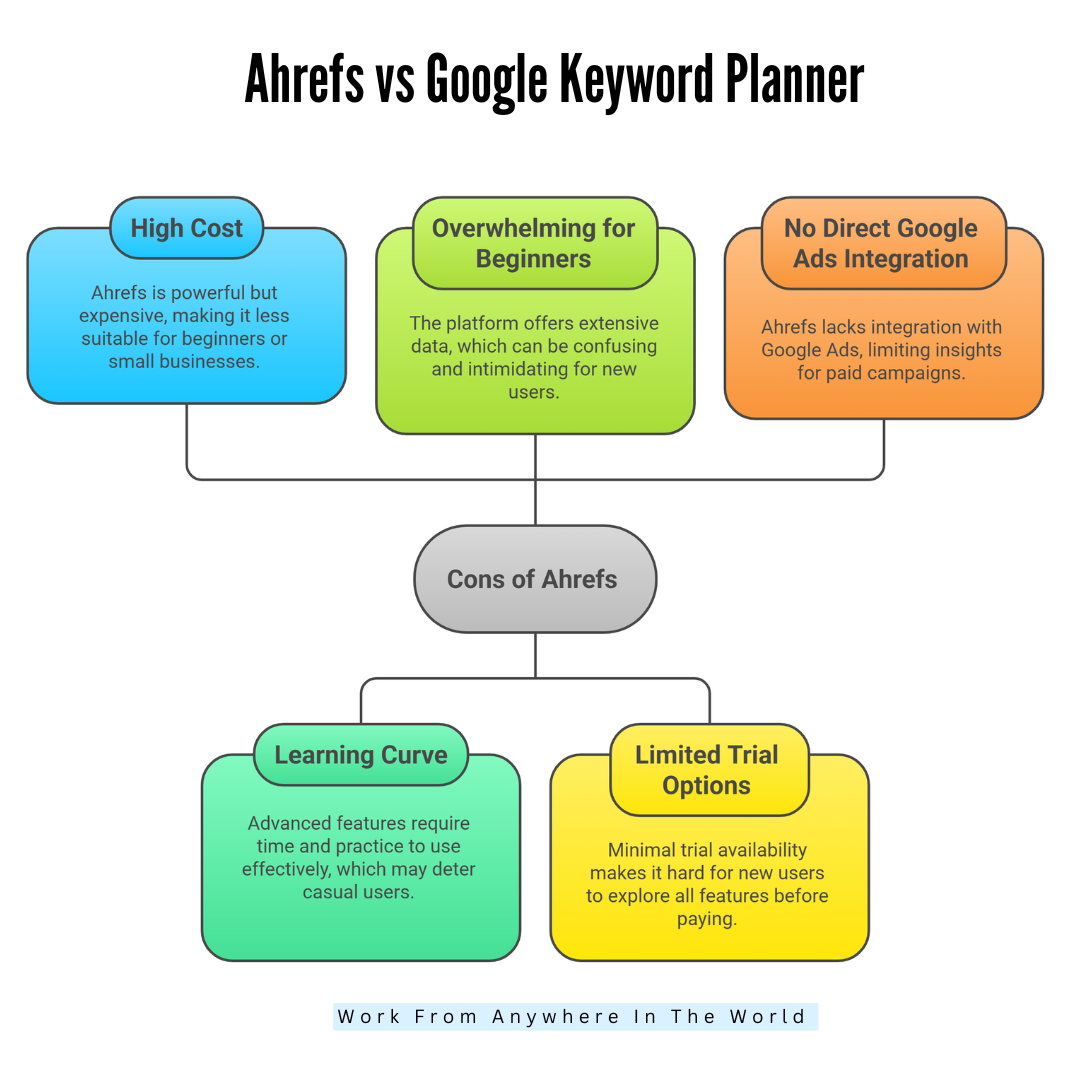
Pros And Cons Of Google Keyword Planner
Pros Of Google Keyword Planner
1. Free To Use
One of the most significant advantages of Google Keyword Planner is that it is entirely free. You only need a Google account, and you can access valuable keyword insights without paying a dime.
This makes it perfect for beginners, small businesses, or anyone on a budget. Even though it’s free, it provides accurate data straight from Google’s search engine, including search volume, keyword trends, and competition levels.
It’s a great starting point for keyword research, helping you plan content or advertising campaigns effectively. Free access with reliable data is a massive advantage for any marketer.
2. Accurate Search Data
Google Keyword Planner provides keyword information directly from Google, making it one of the most reliable sources for search data. You get accurate monthly search volumes, competition levels, and trends based on real user behaviour.
This is extremely useful for identifying which keywords your audience is actually searching for. The data helps you make informed decisions for both SEO and paid campaigns.
While it doesn’t provide detailed SEO metrics like difficulty scores, the accuracy of its search numbers is unmatched. For anyone wanting a realistic view of search behaviour, this tool is hard to beat.
3. Beginner-Friendly Interface
Google Keyword Planner is designed to be intuitive and straightforward, making it perfect for beginners. The user interface is straightforward, simple to use, and doesn't overburden users with analytics.
You simply enter a keyword, website, or topic, and the tool generates relevant keyword suggestions, search volumes, and competition data. Even those new to SEO or online advertising can use it without tutorials.
The simplicity allows users to focus on keyword planning and campaign creation rather than learning complex software. It’s an ideal tool for people just starting in digital marketing or running small projects.
4. Keyword Suggestions And Ideas
You may find fresh keywords and content ideas more rapidly with Google Keyword Planner. You can enter a seed keyword or website, and the tool generates dozens or even hundreds of relevant suggestions.
These include long-tail variations, related terms, and niche-specific keywords you might not have considered. This is especially useful for content planning, SEO optimization, or PPC campaigns.
The suggestions can help you target more specific search queries, reach the right audience, and increase traffic. Even though it lacks detailed difficulty metrics, the raw keyword ideas it provides are invaluable for generating actionable strategies.
5. Integration With Google Ads
Google Keyword Planner is directly integrated with Google Ads, making it perfect for advertisers. You can analyze keywords for both organic search and paid campaigns in one place.
The tool provides estimated cost-per-click (CPC) data, ad competition levels, and potential impressions, helping you plan effective campaigns.
This integration allows a seamless transition from research to campaign setup without switching platforms. Even if you primarily focus on SEO, understanding CPC and competition can guide content strategy.
The connection with Google Ads makes it a versatile tool for marketers who want to optimize both paid and organic search efforts efficiently.
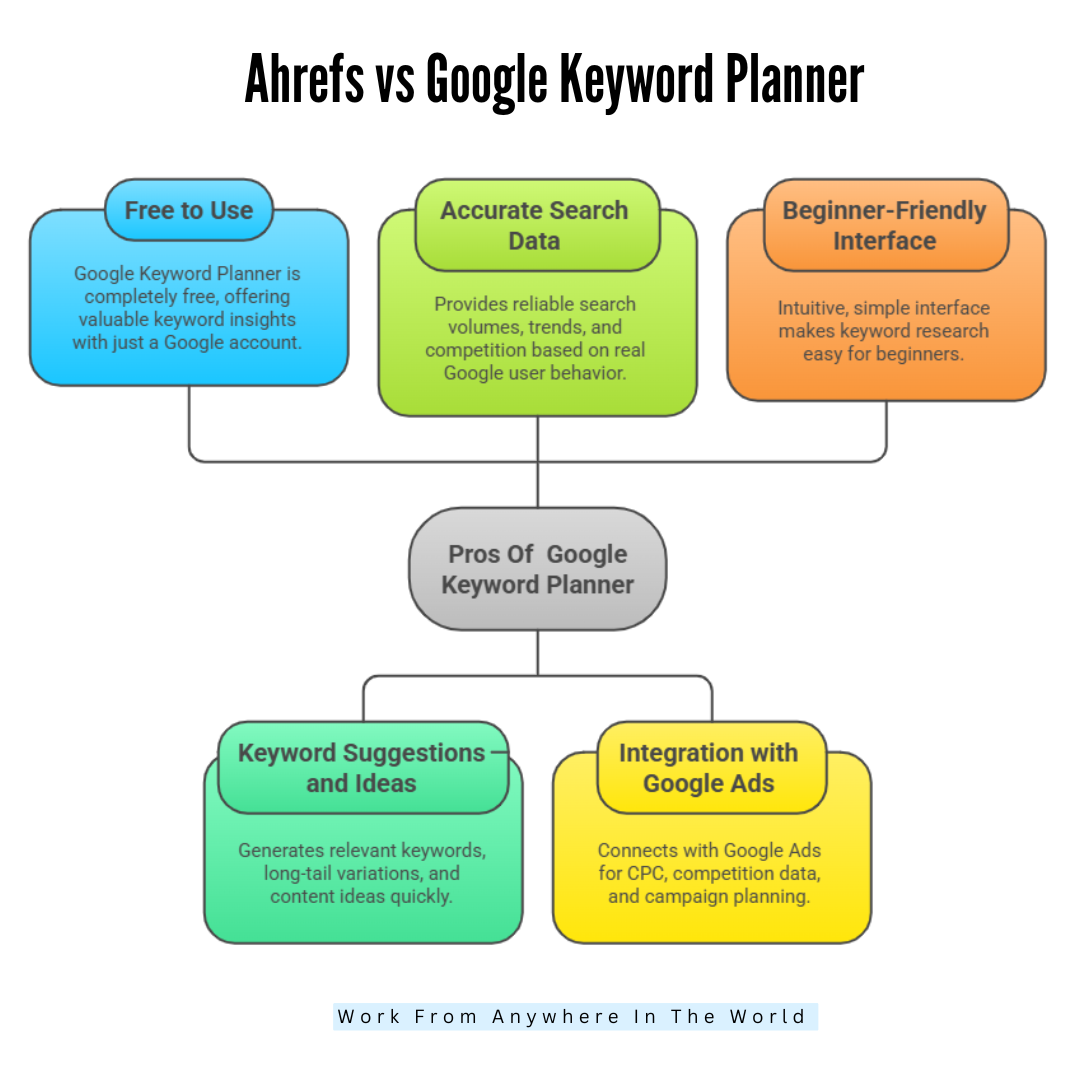
Cons Of Google Keyword Planner
1. Limited SEO Metrics
Google Keyword Planner is primarily designed for paid campaigns, so it lacks many advanced SEO metrics. You won’t find keyword difficulty scores, backlink insights, or organic traffic potential, which are crucial for ranking analysis.
While it shows search volume and competition, these are focused on ad performance, not organic strategy. For serious SEO planning, this can be limiting. Users looking to understand how competitive a keyword is for organic ranking need additional tools.
Essentially, GKP is excellent for ideas and raw data, but it doesn’t provide the complete picture required for in-depth SEO strategy development.
2. Grouped Keyword Data
One challenge with Google Keyword Planner is that it often groups similar keywords. For example, “vegan recipes” and “easy vegan recipes” may be shown as one combined search volume.
This makes it hard to determine exact search numbers for specific keywords. For detailed SEO planning, precise data is essential to prioritize the best opportunities. The grouping can be misleading if you rely solely on the tool to choose which terms to target.
You may overestimate or underestimate potential traffic for specific keywords, making campaign or content planning less accurate without cross-checking with other tools.
3. Minimal Competitor Insights
Unlike platforms such as Ahrefs, Google Keyword Planner does not provide in-depth competitor analysis. You cannot see who ranks for your target keywords, their backlinks, or their traffic data. This limits your ability to understand your competition and replicate successful strategies.
While it helps generate keyword ideas, you won’t gain strategic insights about what’s working for others in your niche. To get a competitive advantage, you need to use additional tools for organic analysis.
Without competitor insights, your content or campaign strategy may be less informed and potentially less effective in outranking similar websites.
4. Limited Long-Tail Keyword Insights
Google Keyword Planner can generate keyword ideas, but its long-tail suggestions are sometimes limited or repetitive. It may not reveal niche variations that have low competition but high conversion potential.
For content creators or marketers targeting specific audiences, this is a drawback. While GKP is excellent for general keyword planning, it may not uncover all opportunities for long-tail optimization.
You should combine it with other tools or research methods to find less obvious, high-value search queries. Missing these keywords can result in missed traffic and growth opportunities, especially for specialized niches.
5. Requires A Google Ads Account For Full Access
To unlock all features and get precise search volumes, Google Keyword Planner requires an active Google Ads account. Users without an account or those who don’t run ads may only see broad ranges instead of exact numbers.
This can limit its usefulness for purely organic SEO research. Additionally, setting up an Ads account may feel unnecessary for those not planning paid campaigns.
While free to access, the need for account setup and limited visibility without ad activity can be inconvenient. Beginners or small website owners might find this extra step frustrating before they can use the tool effectively.
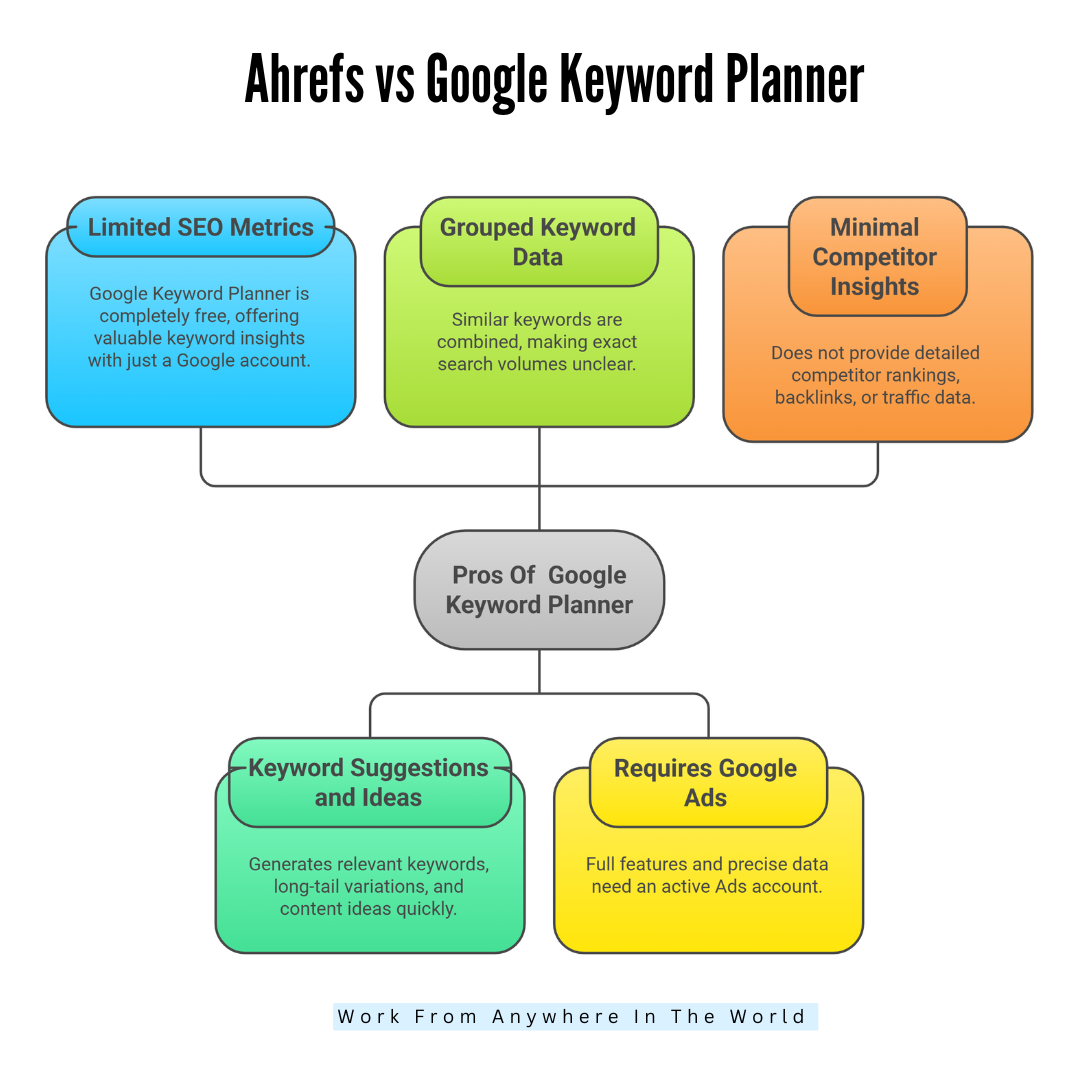
FAQs
1. What Is The Main Difference Between Ahrefs And Google Keyword Planner?
Ahrefs is a paid SEO tool offering in-depth keyword, backlink, and competitor analysis. At the same time, Google Keyword Planner is a free tool focused mainly on Google Ads keyword research and volume estimates.
2. Is Ahrefs Better Than Google Keyword Planner For SEO?
Yes, Ahrefs generally provides more detailed SEO data, including keyword difficulty, organic traffic potential, and SERP analysis—features that Google Keyword Planner doesn’t fully offer.
3. Which Tool Gives More Accurate Keyword Search Volume Data?
Google Keyword Planner provides data directly from Google, but it shows broad ranges. Ahrefs refines this data through clickstream analysis to offer more actionable, SEO-focused metrics.
4. Does Ahrefs Show Keywords For All Search Engines?
Ahrefs primarily focuses on Google but also includes data from YouTube, Amazon, and Bing for certain features, making it more versatile for multi-platform keyword research.
Conclusion
In conclusion, choosing between Ahrefs vs Google Keyword Planner depends on whether you need advanced SEO insights or free, beginner-friendly keyword data.
Ahrefs is ideal for professionals seeking in-depth SEO insights, competitor analysis, and backlink tracking. At the same time, Google Keyword Planner is perfect for beginners or budget-conscious marketers needing accurate, free keyword data.
Together, they provide a powerful approach to boost traffic, outrank competitors, and grow your online presence effectively.
I trust you enjoyed this article on the Ahrefs vs Google Keyword Planner. Please stay tuned for more insightful blogs on affiliate marketing, online business, and working from anywhere in the world.
Take care!
— JeannetteZ
💬 Your Opinion Is Important To Me
Do you have thoughts, ideas, or questions? I’d love to hear from you. Please leave your comments below or email me directly at Jeannette@WorkFromAnywhereInTheWorld.com.
📚 More Work From Anywhere Reads
🚀 Ready to Build a Business You Can Run from Home
Or anywhere in the World?
Imagine creating income on your terms — from home, a cozy café, or wherever life takes you.
With the right tools, training, and community support, it’s entirely possible.
Start your own online business for free — no credit card needed.
Disclosure
This post may contain affiliate links. As an Amazon Associate and participant in other affiliate programs, I earn from qualifying purchases at no extra cost to you. Please read my full affiliate disclosure.




